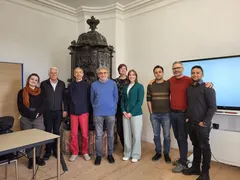The international and interdisciplinary symposium on “Personality Dynamics”, held at the TUM Science & Study Center in Raitenhaslach from December 13th to 15th brought together leading researchers to catalyze a paradigm shift in psychological science. Organized by Prof. Dr. Markus Quirin, Sport Psychology Unit, and PhD Farhood Malekzad, the symposium was funded by the International Society for the Study of Individual Differences (ISSID) and German Research Foundation (DFG). The conference emphasized the importance of considering the complexity of psychological processes in research.
The organizers advocate for an approach termed “Dynamics of Personality”, which highlights the integration of computational modeling of complex systems as a complement to traditional statistical methods in psychology. This methodology allows for more precise simulations of mental and behavioral processes, paving the way for deeper insights into human psychology.
Distinguished experts from around the globe participated in the event, including:
- Prof. William Revelle (Northwestern University, Chicago, USA)
- Prof. Emorie Beck (University of California, Davis, USA)
- Prof. Eranda Jayawickreme (Wake Forest University, Winston-Salem, USA)
- Prof. Marco Mirolli (Institute of Cognitive Sciences and Technologies, Rome, Italy)
- Prof. Marco Perugini and Prof. Giulio Costantini (both from the University of Milano-Bicocca, Italy).
The organizers emphasized the critical importance of this shift in methodology and how to conceptualize personality in general. As Prof. Markus Quirin explains, “Understanding the complexity of psychological processes and simulating them using computational models helps us gain a broader and more nuanced understanding of the human mind. This will ultimately advance and personalize psychological interventions and treatments.”
In addition, the use of computational modeling brings a significant advantage to theory testing. “Computational approaches allow us to formalize theories rigorously, enabling hypotheses to be tested more precisely,” Prof. Quirin notes.
This advancement is particularly vital given the ongoing replication crisis that has affected psychology over the past two decades. The integration of computational methods offers a promising solution by providing a systematic and transparent framework for exploring psychological phenomena.
The “Dynamics of Personality” conference represents an important milestone in the development of psychology as a more dynamic and process-oriented science. It highlights the growing consensus within the field that embracing complexity and leveraging computational tools are essential for addressing long-standing challenges and expanding the boundaries of psychological research.
To the Homepage of the Sport Psychology Unit
Contact:
Prof. Dr. Felix Ehrlenspiel
Sport Psychology Unit
Georg-Brauchle-Ring 60/62
80992 München
phone: 089 289 24545
e-mail: felix.ehrlenspiel(at)tum.de
Prof. Dr. rer. nat. Markus Quirin
Sport Psychology Unit
Georg-Brauchle-Ring 60/62
80992 München
E-Mail: m.quirin(at)tum.de
Text: Bastian Daneyko
Photos: private

